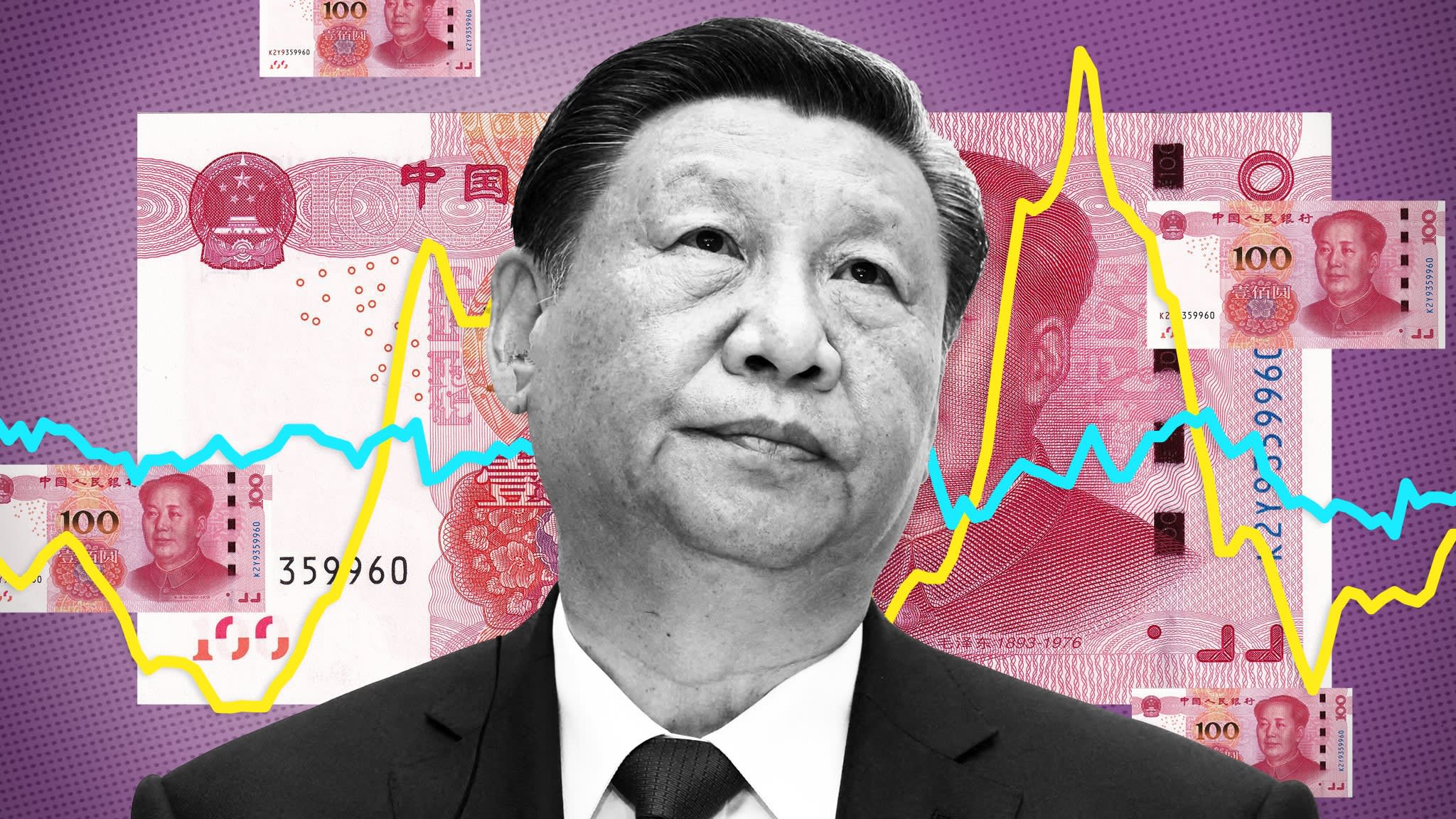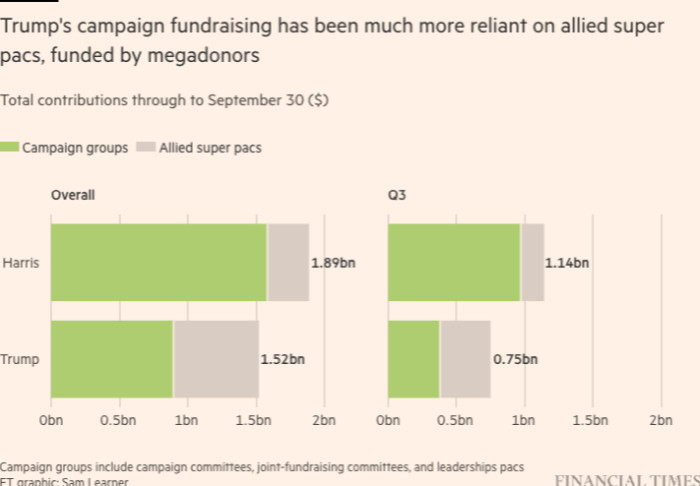This is an audio transcript of The Economics Show with Soumaya Keynes podcast episode: ‘What is Kamalanomics? With James Politi’
Soumaya Keynes
With the US election in a matter of weeks, I thought now would be a good time to talk about the policy platform of vice-president Kamala Harris. Because, you know, she might win and policies matter. This week we are going to ask: what is Kamalanomics?
[MUSIC PLAYING]
This is The Economics Show with Soumaya Keynes. I’m joined by my colleague, James Politi, Washington bureau chief, tuning in from DC. James, hello.
James Politi
Hey, Soumaya, great to be here.
Soumaya Keynes
Great to have you.
[MUSIC PLAYING]
We should probably start by just taking a moment to wish our colleague, Colby Smith, a swift recovery from Covid. She was going to join us, but has been felled by the rona. It’s all very 2020. And also speaking of things that I do not miss from 2020, James, how are you enjoying this election cycle?
James Politi
Well, I mean, it’s gone by so fast, weirdly. Even though I still remember, you know, eating cheese curds and lemonade at the Iowa State Fair in the summer of 2023, and wondering if a certain Ron DeSantis would be able to defeat Trump in the Republican primary. And here we are, two weeks away, and Joe Biden’s not even in the race. And Trump is definitely in contention. So it’s been kind of a wild ride, but it’s nice to sort of see the end of it.
Soumaya Keynes
I mean, I don’t even live in the US right now, and I would be very happy to see the end of it. We’re going to start off with a silly question. How different do you think that Harris’s policy priorities are from those of Biden? Right, so, and I want you to answer me on a scale of one to 10, where one is completely the same, identical. And 10 is polar opposite, couldn’t be further from each other.
James Politi
I would say it’s a three. I think that there’s a lot of continuity in how Harris sees the economy, but there’s some kind of subtle and even not so subtle differences. And there are quite a few unknowns in terms of what those differences are actually going to be and what the implications are for, you know, the policy of a future Harris administration.
Soumaya Keynes
OK, well, let’s get into what we do know. And I want to start with industrial policy, which is probably the thing I most associate with Bidenomics. So is Harris in the same place philosophically on that?
James Politi
Well, I think the industrial policy of the Biden administration is . . . it’s almost like a fait accompli. A lot of the measures have been enacted already, the subsidies are in place, and she’s been completely in favour of that and has embraced them. She doesn’t talk a huge, you know, a lot about it on the campaign trail, though. This is, gonna be a . . . the work of implementation in the next administration. She’s not gonna roll them back. She’s not gonna modify them in a big way. So they’re gonna stay in place, but it doesn’t seem like it’s a huge emphasis for her.
When she talks about manufacturing, and she did in a recent big speech on the economy in Pittsburgh, she talks a lot more about the industries of the future. She talks about AI. She talks about production of advanced technologies. She sort of looks a bit more to the future, I think, than Biden did.
Soumaya Keynes
So just on that implementation piece of the existing industrial policies that Biden got through, one of the bottlenecks for, you know, building new factories, getting some of that investment cash out the door seems to be permitting, right? It seems to be that there are these local obstacles to actually building stuff. Do you think the Harris administration would try to move the dial there?
James Politi
I think she would, and I think that, when you look at that Pittsburgh speech, her whole sort of philosophy was that she’s going to have a more pragmatic approach, and she specifically mentioned permitting and the need to build things faster when it comes to the IRA subsidies and the other subsidies as well and the big investments.
And so I think that the push for permitting was sort of championed by, you know, moderate Democrats, even some Republicans, and it was opposed by the left of the Democratic party, and she’s been shifting to the middle, and she seems to have embraced the idea that, you know, there should be a new permitting bill as well to kind of speed things up. I think that that’s something that we can expect from her.
Soumaya Keynes
OK, well, I guess her ability to get that kind of bill through Congress will depend on the make-up of, you know, the House and the Senate. We’ll see how that plays out. Just sticking on industrial policy for one more question. What would a Harris administration mean for tariffs, right? Clearly the signature issue of the Trump campaign, but what would Harris do?
James Politi
Well, I mean, she’s been very critical of Trump’s tariffs, you know, she’s called them a tax on consumers. So she’s not gonna impose sweeping tariffs on, you know, imports from other countries. And I think she’ll be surely less protectionist than Trump. The question is: to what extent is she going to start rolling back tariffs? That remains to be seen. And whether she’s going to try to seek, you know, new trade deals. She opposed trade deals when she was in Congress, on the grounds that they didn’t have sufficient, you know, environmental and labour standards. But, I think with the proper structure, I think there’s a chance that she might entertain them in the future.
I think that, you know, we have seen on investment, she is opposing the Nippon Steel proposed takeover of US Steel. So she has shown herself to be kind of cautious on sort of issues of international investment. Although I think politically I think she had no choice but to take that position. It would have been very hard for her to come out in favour of that deal in the late stages of the campaign. But I think that generally she is, probably less wedded to using tariffs as a tool of economic policy than Biden was. And certainly compared to Trump, you know, she is deeply opposed to what he’s planning for his administration.
Soumaya Keynes
OK, yeah. I mean, it sounds like there would be quite a lot of continuity there. I would be interested and also very surprised if she started to embrace new trade deals. But I’m sure there would be many, many DC trade wonks who’d be very excited at that prospect.
OK, but let’s now talk about other taxes, right, because in a sense with trade the status quo can persist for a really long time, right? There’s no reason to sign a new trade deal or, you know, necessarily impose huge tariffs on China. But when it comes to other taxes, taxes in the domestic tax schedule, it does seem like some kind of action is a bit more urgent because there are a bunch of provisions in the Tax Cuts and Jobs Act that will expire next year. And, again, obviously the outcome depends on whether the House and the Senate are both under Democrat control. But assuming she gets a clean sweep and gets to sort of put legislation through unimpeded, how would a Harris administration deal with those looming tax increases?
James Politi
I mean, this is going to be the big fight in Congress next year, no matter who wins. And if Harris were to sweep and have a, you know, Democratic Senate, Democratic House, I think that she would go ahead and extend the tax cuts, the Trump tax cuts, up to . . . for households earning, you know, under $400,000 and allow them to expire, ie raise the income tax rate, for individuals and households with incomes above $400,000 a year.
And then there would be other changes, too. She’s proposed raising the corporate tax rate from 21 per cent to 28 per cent. And she has also proposed raising the capital gains tax rate from its current level, which is also at 20 per cent to 28 per cent, as well. And that’s interesting because Biden had proposed raising it to the level of ordinary income, which is close to 40 per cent, and so she’s proposing a smaller increase in the capital gains tax rate, which is, in a way, a sort of olive branch to business and Wall Street.
Soumaya Keynes
What has happened to that proposal to raise capital gains taxes on unrealised income? So I guess you know the income that you would get associated with that say your share price is rising in value that you might not realise but would show up as an increase in your wealth.
James Politi
Well, I mean, theoretically, she’s still in favour of that. It’s something that the Biden administration has proposed, and she hasn’t, in a way, disavowed it. But she doesn’t talk about it much on the campaign trail. It’s not something that she’s aggressively pushing in any way. I think it’s something that she would potentially negotiate away. It’s something that she could give up. It doesn’t seem like it’s a huge focus of hers.
Soumaya Keynes
So just on the corporation tax change then, what do you expect the effect of that would be?
James Politi
Well, I mean, I think that the idea behind the rise in the corporate tax rate is to, you know, raise some more revenue that corporations have earned very big profits during this period. And I think, from a Democratic point of view — big D — Democratic point of view, the party feels like they need to pay their fair share and they need to use that revenue to fund some important domestic priorities.
Lifting it from 21 to 28 per cent still doesn’t go as high as it was before the Trump tax cuts. So it’s 35 per cent before Trump came in and cut it. But it goes to the level that Obama had suggested to bring it down to. So it’s been the sort of compromise level within the Democratic party for the corporate tax rate. Almost for, like, many years, this is where Democrats, you know, believe the corporate tax rate should be.
Soumaya Keynes
I was actually just reading a paper in the Journal of Economic Perspectives about the effect of the Trump tax cuts to see, you know, if there was anything we knew about what effect reversing them would have. And the headline that came out was that the first order effect would be that revenue would increase, right? The tax cuts in the first place were very expensive. There were some who argued that it would raise so much revenue that it would almost pay for itself. That did not happen. This is a vastly expensive tax cut. But also there was apparently an increase in investment in response to the original tax cuts. So I guess one worry could be that if you reverse that, if you raised corporation tax, then some of that could go away, right? And you might get a kind of depressing effect on investment.
James Politi
Well, I mean, I think, like, that’s going to be the argument that opponents of the corporate tax rate are going to put forth, especially Republicans. They’re going to say it’s going to hurt jobs, it’s going to cause companies and businesses to retrench and I think certainly if the increase in the corporate tax rate was, you know, massive, I think you would be concerned about those kinds of effects. But I think the calculation from the Democrats’ point of view is that bringing it up to 28 per cent is not a sufficient increase to really trigger those negative economic effects and it brings some benefits to the revenue side, which can be used to fuel investment in other areas.
Soumaya Keynes
Yeah, I mean, it’s reversing half of the overall tax cuts, so I guess it would seem a bit weird to say, well, if you wanted half of it, then there’ll be a zero effect. But if you undid all of it, then you would have the complete opposite effect, but maybe that’s politics speak for you.
OK, let us move on to tax credits. I have seen that among the tax credits that she wants to give, she wants to restore kind of Covid time expansions of child tax credit that were pretty generous. I think she wants $3,000 for parents of kids over six and even more for parents with younger kids than that. And also it would go to parents whose tax bill was lower than the amount of the credit, right? So some people would essentially be receiving cash from the government. All this sounds quite expensive, but presumably there would be some good effects as well.
James Politi
Well, I mean, this was really one of the key policies enacted during the pandemic and there was a lot of recrimination on the Democratic side that it expired and went away. And she’s trying to bring it back. They haven’t succeeded so far. At the time, you know, it was really crucial for many families. It helped lift, you know, entire low-income households out of poverty and was seen sort of a . . . as a linchpin for the rescue of the American economy out of the pandemic. And she wants to institutionalise it. And there are even some Republicans who support, you know, greater help for families through the child tax credit. So it’s one where she could get bipartisan support, potentially. I think a lot of that remains to be seen.
Soumaya Keynes
So I’ve been following this debate on how much the child tax credit affected poverty during the pandemic and it’s really interesting. I think the main consensus most studies essentially found it had these huge effects. I think there was a census bureau study saying that it lifted nearly 3mn kids out of poverty.
But then this month, there was a new NBER working paper, which is about as exciting as it gets for economics writers like me, that actually found that, yes, the child tax credit did have big effects on poverty, but it was really the stimulus checks that had much bigger effects. And obviously the stimulus checks are extremely untargeted, more expensive for that reason. So you probably couldn’t essentially roll out the UBI for the whole US population. So I get why they’re going along the child tax credit route. But yeah, I mean, I guess the headline is: you give people money. It does lower child poverty, which is you know maybe not that surprising, but maybe Americans needed to be told. OK, so you’ve got child tax credits, but there are also other areas in which she wants to hand out tax credits. Could you talk about some of those?
James Politi
Well, she definitely wants to hand out new tax credit for homebuyers, first-time homebuyers in particular. She’s trying to promote, you know, more affordable housing. She thinks it’s really important. There’s a kind of housing crisis in the American economy at the moment, which is actually weighing down the campaign, as it’s been big source of sort of disgruntled, young households and young voters. So I think she’s trying to tackle that. She’s also trying to provide new incentives and new support for home care, for seniors. That’s through a new Medicare benefit, which is the big healthcare plan for older people in the United States. It’s not, you know, technically a tax credit, but it’s definitely a new benefit that she’s proposing. And this all falls into the category of the, sort of, care economy, which is, you know, unfinished business of the Biden/Harris administration and it’s part of their vision to kind of expand the social safety net that they weren’t able to pass through Congress. So I think she’ll definitely try if she wins, to pass as much of that as she can.
Soumaya Keynes
What was the flavour of the resistance?
James Politi
I think that the Biden bills on infrastructure and then the Clean Energy Subsidies and the Chips Act took up so much political space that they just weren’t able to get to it. Something had to fall by the wayside. I think it’s a matter of priorities. And I think it’s . . . Biden himself was not maybe as committed to this as she is, frankly. And so, when sort of push came to shove in the final negotiations over these bills, something had to fall by the wayside. That’s what kind of was the victim in the end.
Soumaya Keynes
So on the housing issue, one of the concerns that you hear is that some of the measures dedicated to supporting, say, first-time buyers, you know, giving them some assistance with down payments. The concern is that is just going to pump up demand and raise prices and not actually do anything to deal with the fundamental problem, which is highly restricted supply. Where do you fall down on that?
James Politi
Well, I think I agree that that’s a concern. I think that, you probably . . . it probably only works if the two are paired. And she’s proposed to increase, you know, the supply of affordable housing. But exactly how she gets there is pretty hazy in her plans. There’s a big question mark surrounding how you get from here to there on affordable housing, and if you just sort of pump the housing market with, you know, new tax credits for down payments, which is what she’s suggesting, it will give a leg up to, you know, a number of young first-time home buyers who can take advantage of it. But I’m not sure it solves the problem in the long run.
Soumaya Keynes
But wait, she has said in her platform documents that she would expand an existing credit to those building homes for low-income communities, which I guess seems like one way of trying to stimulate supply of that kind of housing. Is the issue that that’s just sort of too small bore to make much of a difference?
James Politi
Yeah. I think that that’s one of the problems with, you know, these Harris proposals to begin with, is that there’s this certain incrementalism that’s involved with them. I mean, you know, a marginal increase in an existing tax credit is not exactly going to transform the housing market in a way that makes it more sort of sustainable and really more affordable for many people. It might make for a good campaign speech and it’s, you know, put out there as a new policy proposal, and she has been under pressure to roll out new policy proposals, but I think in practice these are not enough, you know, to really shake up the American economy.
Soumaya Keynes
OK, well, I want to wrap this a little bit up now because we’ve got changes in the tax schedule, we’ve got changes in some benefits. What does this all mean for the distribution of income, right? How do rich folks fare from this versus the poor?
James Politi
So the Penn Wharton Budget Model has estimated gains of at least $2,000 for the bottom four quintiles of the income distribution. So, it means that, you know, when she says, oh, I’m focused on the middle class, and she says that, frequently says that she’s focused on the middle class rather than the wealthy, I think it’s fair enough based on some of the modelling that we’ve seen.
However, I think it’s also important to point out that her policies are kind of less aggressive in, you know, hitting some of the big income streams of the wealthy families such as the capital gains tax, compared to Biden. And she has sort of cast herself as more pro-business in a certain sense, more pragmatic, compared to Biden. So I would expect that her policies, especially given the likelihood that she will be governing with a Republican Senate, will turn out to be, sort of more favourable to the wealthy, potentially, than Biden’s in the first two years, for example.
Soumaya Keynes
Yeah, I mean, I saw the same tables that you did, and one thing that really struck me was that it was only when you got to the richest 5 per cent of people that there were any losses from this package of policies. And you know, the idea that you have a package that, basically, seems to benefit 95 per cent of the population — and that’s the middle class — is quite extreme. And you know, earlier we were talking about that threshold of $400,000, right, she doesn’t want to raise taxes on people earning below that. $400,000 is a lot of money, and I know America is a rich country but still that’s just a lot so, maybe it’s just that Kamala Harris’s middle class isn’t quite my middle class.
James Politi
I mean, I think the suburbs are really the key target there and Democrats have been making big gains among college-educated suburban voters who previously voted for Republicans and I think that if you start to really go much lower than $400,000 thresholds, then you’re really hitting those households in the kind of more affluent college-educated suburbs and I don’t think she wants to go there.
Soumaya Keynes
Yeah. Politics, man. What are you going to do? OK, so that’s the distributional side of things, but what about the effect on borrowing? What do we know about what all of this would do to the deficit?
James Politi
Well, I mean, we know from the Committee for a Responsible Federal Budget, which is a kind of centrist group in Washington that looks at these things really closely, that the Harris proposals would increase the deficit by, or the debt rather, so accumulation of deficits by $3.5tn over the next decade. And that’s a significant amount of money.
However, it’s a lot less than what the Trump policies would do. The deficits, according to the same model, I mean they see it, you know, the Trump policies leading to a $7.5tn increase in the debt over the same period. So this is deficit-based policy platform coming from Harris, but it’s less, certainly less than Trump.
Soumaya Keynes
OK, so neither party is really gonna try and get a handle on this enormous deficit that the US government is running but Trump would be worse. OK, well I want to move on to policies that shouldn’t cost the government money, but that at least are being packaged as though they would still help ordinary households with their bills. So, one thing that got some attention were price gouging laws. What do you make of those?
James Politi
Well, so what Harris proposed, almost out of the gate, it was one of her first economic proposals, you know, after she launched her race for the White House and took over from Biden, was a proposal to kind of empower the Federal Trade Commission, to go after grocery companies that are price gouging. And then she proposed this sort of, federal ban on price gouging by, you know, grocery stores and food companies, which got a lot of attention because it was seen as a first step towards price controls and some even said it was, you know, Harris trying to impose sweeping price controls.
It’s actually like a very narrow proposal, and I think some of the hyperventilating around that kind of have since subsided. But that is definitely a continuation of the Biden administration’s, sort of, philosophy, which is that in order to keep a lid on prices, you have to go after the companies and the businesses that are raising the prices. So sort of a more confrontational attitude towards business. And what’s interesting about that is that it’s not clear, despite that proposal on, you know, related to food companies, it’s not clear that Harris is really wedded to that philosophy.
Soumaya Keynes
Yeah, I mean one of the things I was really interested by, when reading through her policy document, I don’t think is going to make a big macroeconomic effect, but it did stand out, that she wants there to be a bill cracking down on algorithmic price fixing by landlords. And this seems to be an area that is actually . . . it’s already illegal to price fix using algorithms. There was an FT notice to that effect earlier this year but still it was this kind of almost like a retail offering, right? That the ordinary people could get behind. But I just wasn’t sure that it would be that meaningful when it came to it because the authorities have already kind of said, you know, this isn’t OK.
James Politi
Yeah, I mean, I think it just, it goes to the fact that she’s making proposals which might not see the light of day but are good on a fact sheet that you put out before a campaign release. I mean, it seems like it’s not necessarily something that has been thought through, in all its ramifications.
Soumaya Keynes
Politicians trying to appeal to voters. Who would have thought it? OK. Well, look, I want to throw to a break now, but when we get back, I’m going to ask for some gossip. Who do you think would staff a Harris administration?
[MUSIC PLAYING]
[TECH TONIC TRAILER PLAYING]
Soumaya Keynes
We are back from the break. So if Harris were to win, and that’s a big if, of course, do you think everyone would stick around? Would it be continuity of personnel or would it be all new faces?
James Politi
I think there will be quite a bit of continuity, but there will be some new faces. We know that she said she’s gonna appoint a Republican to her cabinet, but it’s unclear if that would be in a top job or a minor cabinet position.
I think that on the economic front, there are two figures who I think could potentially be in line for the top job either at Treasury or to be, you know, Jay Powell’s successor at the Fed. I mean, Lael Brainard certainly comes to mind as really a key figure who could be in both those jobs, if the Democrats hold on to the White House.
Soumaya Keynes
But, wait, wouldn’t she be seen as a political choice to put in the Fed, which has sort of traditionally tried to at least appear distinct from that kind of partisanship?
James Politi
Well, I think that she has, you know, gained some credit on, sort of, both sides of the political spectrum. And depending on what her margin is in terms of Senate confirmation, I think it’s possible that she could, you know, win confirmation if she’s selected. Given that she’s already been at the Fed, I think that’ll help her. She’s certainly taken on a more sort of political role in the last couple of years since leaving the Fed, so that might work a little bit to her disadvantage. But, I think overall in terms of qualifications, there’s, I think, little doubt that she could do the job.
I think when you look at Treasury, I think all eyes would be on Wally Adeyemo if she decides to make a selection from within and doesn’t go for Lael Brainard. He’s the deputy now, very well respected, I think on both sides. So that’ll be very interesting. Then there’s the question of: is she gonna bring in someone from business? She is you know, sort of, more pro-business, I think, than Biden, instinctively. So I think there’s, you know, new hopes in sort of corporate America that maybe she’ll bring in someone from business. I mean, one of the top jobs, certainly Commerce, is a possibility. Gina Raimondo could move or could stay in her job, she’s quite highly regarded as well. So in terms of continuity, those are the key questions at the moment.
But then there’s the big discussion and the big debate is whether Harris would keep Lina Khan as chair of the FTC and Jonathan Kanter, the main antitrust official at the justice department. They’ve been the Biden administration’s big trust busters. They’ve been, sort of, defied corporations and Wall Street again and again and again over the last few years. There’s heavy pressure on Harris from the business community and donors to get rid of them. But, you know, there are others who are close to her who want to keep them. And that will be, like, the big litmus test, ideologically, of where she stands on corporate America, and will be one of the most interesting things to watch during the transition.
Soumaya Keynes
OK, well, when we’ve all recovered from the election cycle — if Harris wins, and she may not — we’ll be watching. Thanks so much for joining me, James.
James Politi
Thanks Soumaya. It’s been a pleasure.
[MUSIC PLAYING]
Soumaya Keynes
That is all for this week. You’ve been listening to The Economics Show with Soumaya Keynes. If you enjoyed the show, I would be eternally grateful if you could rate and review us wherever you listen.
This episode was produced by Edith Rousselot, with original music from Breen Turner. It is edited by Bryant Urstadt. Our executive producer is Manuela Saragosa. Cheryl Brumley is the FT’s global head of audio. I’m Soumaya Keynes. Thanks for listening.




































































































































































You must be logged in to post a comment Login